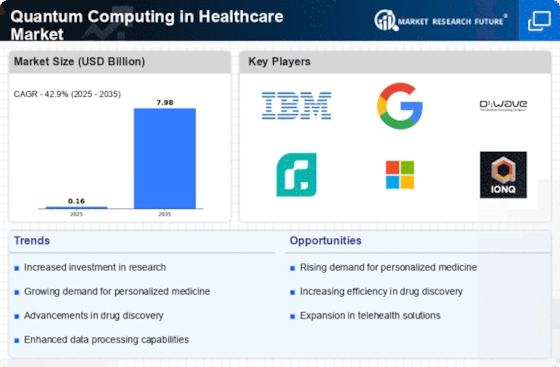Top Industry Leaders in the Quantum Computing in Healthcare Market

Competitive Landscape of Quantum Computing in Healthcare Market: A Deep Dive
The healthcare industry stands on the precipice of a revolutionary transformation, propelled by the burgeoning field of quantum computing. This nascent technology promises to unlock unprecedented capabilities in drug discovery, personalized medicine, medical imaging, and beyond. As a result, the competitive landscape in the quantum computing in healthcare market is rapidly evolving, with established tech giants, startups, and research institutions vying for a foothold in this lucrative and impactful domain.
Key Players:
- IBM Corporation
- Microsoft Corporation
- Google LLC
- D-Wave Systems
- IonQInc
- Rigetti Computing
- Fujitsu Ltd
- Intel Corporation
- Honeywell International Inc
- AT&T Inc.
Strategies Adopted:
-
Partnerships and Collaborations: Recognizing the fragmented nature of the ecosystem, key players are actively forging partnerships with pharmaceutical companies, healthcare providers, and academic institutions. This collaborative approach fosters knowledge sharing, accelerates research and development, and facilitates real-world applications of quantum computing in healthcare. -
Cloud-based Platforms: To democratize access to quantum computing resources, tech giants like IBM and AWS are offering cloud-based platforms that allow researchers and developers to experiment with quantum algorithms and applications without the need for expensive on-premise infrastructure. -
Talent Acquisition and Development: The specialized skillset required for quantum computing development is in high demand. Companies are actively recruiting talent with expertise in physics, computer science, and mathematics, while also investing in training programs to upskill their workforce in this domain. -
Investment in Hardware and Software: Continuous advancements in qubit technology and quantum algorithms are crucial for sustained market growth. Companies are heavily investing in research and development to improve the performance, scalability, and reliability of their quantum computing offerings.
Factors for Market Share Analysis:
-
Quantum Hardware Capabilities: The number of qubits, qubit coherence time, and error rates are critical parameters that determine the processing power and accuracy of a quantum computer. Companies with superior hardware capabilities are likely to gain a competitive edge. -
Software Ecosystem and Algorithms: The availability of user-friendly software tools and efficient quantum algorithms specifically designed for healthcare applications will be crucial for attracting users and driving adoption. -
Industry Partnerships and Collaborations: Strong partnerships with key stakeholders in the healthcare industry will provide companies with access to valuable data, real-world use cases, and potential customers. -
Talent Pool and Expertise: The ability to attract and retain top talent with expertise in quantum computing, physics, and healthcare will be essential for long-term success.
New and Emerging Companies:
Several new players are emerging in the quantum computing healthcare market, bringing fresh perspectives and innovative approaches. Some notable examples include:
-
QuTech: A Dutch research institute developing hybrid quantum-classical algorithms for drug discovery and materials science. -
Cambridge Quantum Computing: A British company specializing in quantum algorithms for personalized medicine and protein folding simulations. -
QC Ware: A US-based company offering a cloud-based platform for developing and running quantum algorithms for various applications, including healthcare.
Current Company Investment Trends:
-
Focus on Drug Discovery and Development: Quantum computing holds immense potential for simulating complex molecular interactions, accelerating drug design, and optimizing clinical trials. Pharmaceutical giants like Pfizer and Novartis are actively investing in this area. -
Personalized Medicine: Tailoring treatments to individual patients' genetic makeup and medical history is a key driver of healthcare innovation. Quantum computing can analyze vast amounts of patient data to identify personalized treatment options and predict disease risks. -
Medical Imaging: Quantum algorithms can enhance the resolution and accuracy of medical imaging techniques like MRI and PET scans, enabling earlier disease detection and improved diagnosis.
Latest Company Updates:
D-Wave Systems Partners with Merck to Tackle Protein Folding:
On December 5th, 2023, D-Wave Systems, known for their quantum annealing technology, announced a partnership with pharmaceutical giant Merck to utilize quantum computing for protein folding simulations. This collaboration aims to accelerate drug discovery by accurately predicting protein structures, a longstanding challenge in the field.
Microsoft Launches Quantum Healthcare Initiative:
On October 26th, 2023, Microsoft unveiled its Quantum Healthcare Initiative, a research program dedicated to advancing the use of quantum computing in healthcare. The initiative focuses on areas like drug discovery, medical imaging, and personalized medicine.
IBM Quantum and Brainch Combine Forces for Medical Research:
On September 21st, 2023, IBM Quantum and Brainch, a biopharmaceutical company, announced a collaboration to explore the use of quantum computing for personalized medicine. The partnership aims to identify genetic variants associated with complex diseases, paving the way for tailored treatment options.










